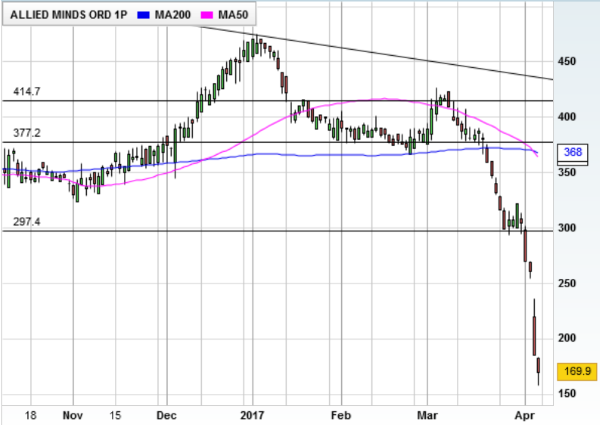Neil Woodford brushes off Allied Minds crash
6th April 2017 12:47
Hear that? It's the sound of over £60 million going up in smoke, and what star fund manager Neil Woodford heard this week when announced a $146 million write-down, wiping more than £230 million off its market value at one stage Thursday.
A decision by the Boston-based intellectual property investor to scrap seven businesses dumped the share price from 260p at Tuesday's close to as low as 158p. A month ago they were worth 426p!
That's a big hit for Woodford, who owns around 28% of the company after pumping in another £15 million last December. It also follows what Woodford himself called a "disappointing" 2016 during which his fund underperformed the wider market.

But don't be too hard on the man, every investor hits a rough patch; Warren Buffett still has nightmares about the day he went shopping at Tesco and left with a £288 million hole in his pocket.
And Woodford, never short of confidence, has issued a defence. He's reportedly dismissed the Allied Minds plunge as "short-term noise," arguing that "share price movement can miss the longer-term opportunity". But Woodford had clearly been busy writing another missive ahead of the Allied dive.
Timed to coincide with the start of trading in his third fund – the Woodford Income Focus fund – next week, not the Allied Minds collapse, Woodford issued a missive trumpeting the value of equities as an asset class. He also took the opportunity to attack the growing army of closet-trackers.
"As an active investor, I spend a lot less time worrying about the overall market valuation than a lot of other investors and indeed market commentators do," he says. "Nevertheless, I am confident there is a very attractive opportunity from here in UK equities, in an asset class that I continue to believe is undervalued."
That he can build a portfolio yielding 5% is evidence, and he points out that a mid-teens price/earnings (PE) multiple for the UK stockmarket is not cheap, but certainly not expensive either. And volatility triggered by European elections this year should only be "short-term and temporary".
There's a nod to the benefits of passive investment, but Woodford, predictably, backs himself to "do considerably better than an index tracker over the long-term", identifying the "pockets of undervaluation" a tracker will not isolate.
"To be successful, active fund management requires discipline, conviction and a lot of hard work," he argues, "but that work does pay off in the long-term."
However, Woodford has a word of warning for the fund industry, increasingly polarised as investors choose either passive strategies or genuinely active fund managers. Woodford claims the bulk of the fund management industry "sits awkwardly in the middle" - in effect closet-trackers charging high fees for "mediocre" performance – and is "under threat".
"With the regulator seemingly keen to ensure a clearer link between performance and charges, life is going to get even tougher for closet-tracker funds and the fund management companies that offer them."
This article is for information and discussion purposes only and does not form a recommendation to invest or otherwise. The value of an investment may fall. The investments referred to in this article may not be suitable for all investors, and if in doubt, an investor should seek advice from a qualified investment adviser.
Editor's Picks